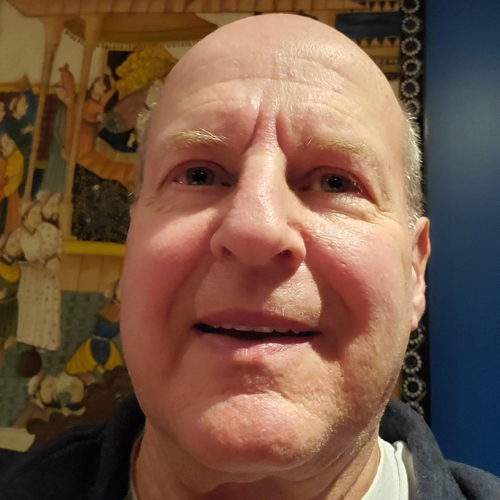Ed Epstein shares journey from DI newsroom to professional success
May 17, 2023
Printers, pressmen and typesetters filled the basement of Alumni Hall as Ed Epstein walked in. A freshman at that time, Epstein said seeing that scale of operation was “very intimidating” but “very awesome.”
Throughout his time at The Daily Illini, Epstein morphed into different roles. Starting off as a reporter, Epstein said he learned “invaluable” lessons.
Working at The Daily Illini taught Epstein how to report independently, he said. He had to break himself apart, building on his strengths and minimizing his weaknesses.
“You’ll learn how to be a reporter, a journalist and an editor,” Epstein said. “Thousands of journalists come through The Daily Illini for that reason, because it’s a great crucible for learning.”
As a sophomore, Epstein became The Daily Illini’s city editor, after which he transitioned to covering public affairs in his junior year. He became a managing editor his senior year.
Get The Daily Illini in your inbox!
Days before graduating, Epstein said he worried about finding a job. However, he decided to try calling a recruiter he had spoken to earlier.
When he “finally worked up the courage” to call, Epstein said he expected to leave a message with his secretary. Instead, his secretary put Epstein on hold.
After a moment, he said he heard the recruiter’s voice on the phone.
“I remember clearly, he said, ‘It’s amazing that you call me right now,’” Epstein said. “‘I just this minute got off the phone with a friend in New York. He said he’s been trying to hire our beginning copy editor for the Dow Jones Journal. And I’d forgotten all about you, so I told him I didn’t know anybody. Would you like me to call him back and say that you’re interested?’”
At that moment, Epstein said he tried not to jump for joy, crediting the job acquisition to his time at The Daily Illini.
He worked in New York for a few years, but someone recommended he join the Asian Wall Street Journal.
Without many familial ties in the United States, Epstein decided to work in Hong Kong for about four years.
Working from 2-10 a.m., Epstein said the job exhausted him and Hong Kong’s tropical climate did not help.
“A very strange experience, but a great experience,” Epstein said. “I wouldn’t have missed that for anything in the end.”
In Chicago, Epstein said he became a night city editor at the Chicago Sun-Times.
When Father’s Day came up, Epstein suggested going out to the zoo and writing a story on the best animal father.
“We thought it was kind of crazy, but (the zoo) said, ‘We have the perfect guy for you,’” Epstein said.
Epstein ended up writing a story on a gorilla named Frank, he said.
“The gorilla keeper was reluctant, but he finally took me into the cage,” Epstein said. “Frank came right up to the bars and I got to hold hands with him. He was a good father.”
However, he soon left the Chicago Sun-Times after Rupert Murdoch acquired the newspaper and made controversial changes.
“I would have stayed there forever,” Epstein said. “It was a dream job for me to be on the newspaper in Chicago, but that went away. I was not going to stay there with (Murdoch’s) craziness.”
Moving to San Francisco, Epstein became the city editor of the San Francisco Chronicle for about four years. Afterward, he became a reporter that covered politics, world affairs and higher education.
However, Epstein also covered an earthquake.
“The earthquake hit in October 1989,” Epstein said. “It was a big news day anyway because the San Francisco Giants were playing the Oakland As in the World Series, which is like the Cubs playing the White Sox.”
The game was at Candlestick Park and the evening looked like it would be nice, Epstein said.
“Exactly at 5:04 p.m., the earthquake hit,” Epstein said. “A tremendous earthquake. Things are shaking, trembling, flying off the walls and stuff. And the power went out.”
When they finally got some emergency generators in the newsroom, Epstein said they printed a small edition with his name on the front page.
A few dozen people were killed and about a hundred were injured, Epstein said.
“You can fly in or drive into a fire or flood or a hurricane or a tornado or an earthquake,” Epstein said. “It’s something different when you’re part of the story, when you’re a survivor.”
However, in 2007, Epstein said “the newspapers were imploding, one after the other.” The Chronicle was bought out, which made Epstein move on to the Congressional Quarterly.
At that publication, Epstein continued covering House leadership and Congress.
“The covering of Congress is not as glamorous as it sounds,” Epstein said. “In fact, it’s quite the opposite. It’s a lot of long hours standing on those marble floors, waiting for politicians to come out of one of their endless meetings and lie to you or ignore you.”
The Congressional Quarterly was also sold off, which prompted Epstein to move onto Argus Media, an international energy markets reporting company.
“I could see that the newspaper business was not healthy, so I went to work there,” Epstein said. “It was pretty boring, but it was fun.”
Now, Epstein is semi-retired, working two days a week to raise money for The Daily Illini.
“If we don’t raise the money it’ll be curtains,” Epstein said. “So far, we’re doing okay. I hope we can continue to help keep you guys going. … It’s not just a trip down memory lane for us who are involved. We’re concerned about the future of journalism and we want people to have the same opportunities we had, and we want independent student newspapers to keep going and to flourish.”






